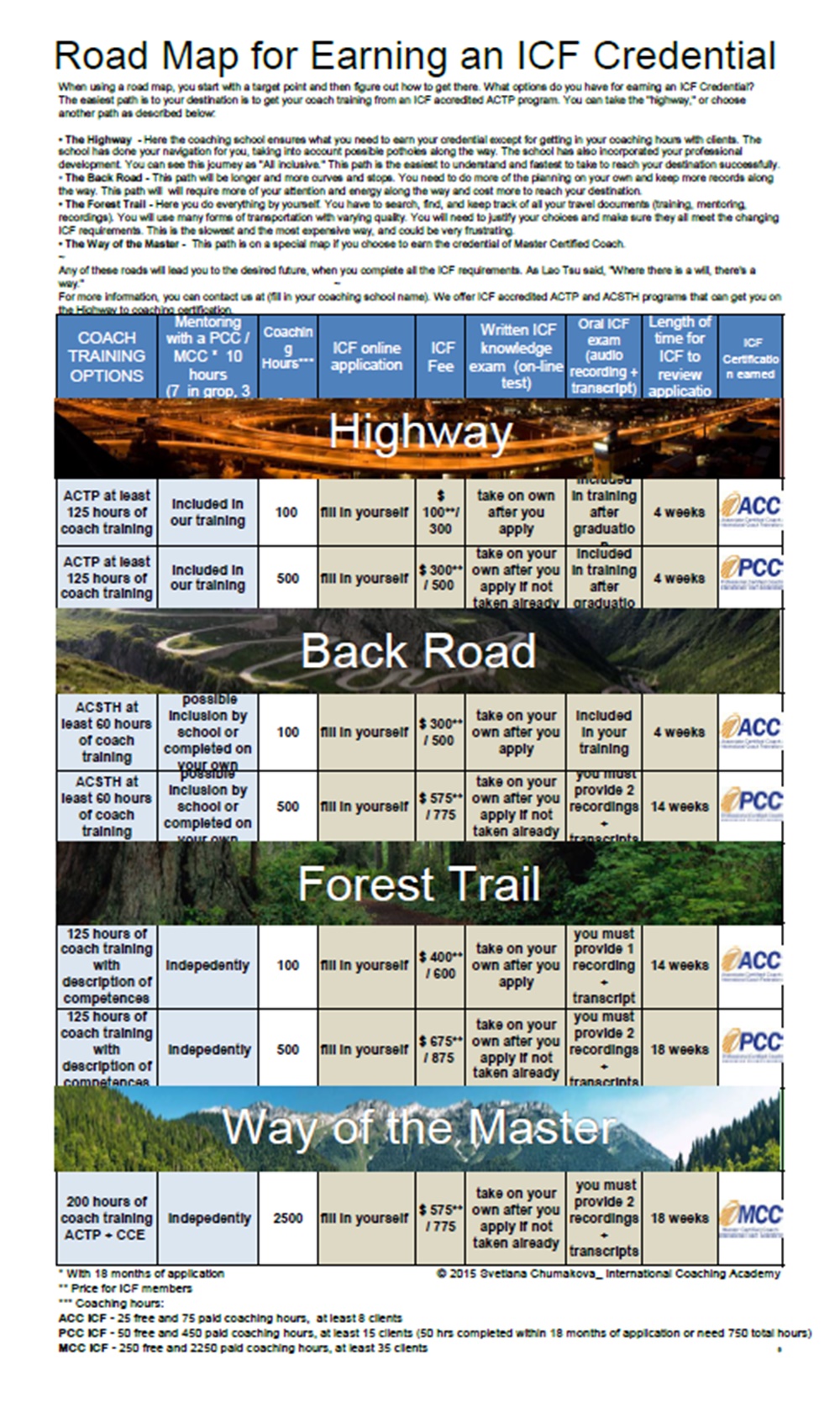This blog requests that you engage and offer comments regarding the ICF PCC Markers. Volunteer coaches and staff from ICF have been working on these so that PCC coach candidates receive objective and effective evaluation and assessing for their credential.
These markers have implications for the training schools, and to that end ICF is partnering with ACTO to communicate and educate our members at the annual conference in May. Please comment on this blog by answering these questions:
- What do you want to know about the ICF PCC Markers?
- What do you want to take away from this 1-hour session?
The panel will review your responses to aid in their preparation for the upcoming conference in May and the Forum call in June.
*******************************************
Este blog te invita a involucrarte y a ofrecer tus comentarios respecto a marcadores de PCC de la ICF PCC.. Entrenadores voluntarios y personal de ICF han estado trabajando en estos, para que los candidatos a credencializar como PCC, reciban una evaluación objetiva y eficaz para su credencial.
Estos marcadores tienen implicaciones para las escuelas de formación, y con ese fin ICF se ha asociado con ACTO para comunicar y educar a nuestros miembros en la conferencia anual en mayo. Por favor, comentar en este blog respondiendo a estas preguntas:
¿Qué quieres saber sobre los marcadores ICF, PCC?
¿Qué quieres llevarte de esta sesión de 1 hora?
El panel revisará tus respuestas para asistir en su preparación, para la próxima conferencia en mayo y el Foro del mes de junio.



To satisfy a marker requirement, does the coach need to demonstrate something just once within a session, or does the missed opportunities factor in against the demonstration?
PCC Markers
I have only heard about a group of experienced coaches and coach trainers working on them and they seem to be excided about them in training assessors . . . So, what exactly are PCC markers?
Can anyone give me an example? How and when will my ACTP program assessors have access to these PCC markers? What type of repeatable – reliable testing has been done across different assessors hearing the same coaching session?? Is all of this still a TOP Secret??
Love & Respect,
Peter
When will there be training available for all school assessors so we can be sure we are accurately assessing to a PCC baseline? We were told there would be e-learning available for the schools shortly after the ICF assessor training. Is that still the plan?
I still rely on the 2006 Rating Worksheet for Live and Tape Exam because it DESCRIBED the behaviors and elements important for each level vs. a checklist. What about combining the paragraphs with these check lists? The paragraphs were easier to understand (although the bullet points make it easier to grade using consistent language). It was also helpful because the ‘paragraphs’ compared ACC to PCC to MCC so it is easier to realize distinctions vs. elements that ‘have to’ be present. It also makes it easier to do the overall assessment immediately and then go into the finer details as to why it is or isn’t PCC level.
I do think they are helpful but agree with Marion that the paragraphs on the old form were more ‘behaviorally described” maybe a combination would be helpful….and will there be markers for ACC and MCC as well???
I commend ICF for the work involved in creating the markers and the training for ICF evaluators. I have been told that it was a multi-cultural/international group which I also applaud. My frustration is that the training for school evaluators has not happened. Question 1: When can we expect training for at least one school assessor? (We have been told it would happen for 2 years with no announcement of any training for schools.) We are using the markers along with the definitions, as Marilyn Franklin wrote, to assess our students for certification as well as within our mentoring of students. While the markers are allowing us to be a little more objective with our evaluations, we see that each assessor’s interpretation is still somewhat subjective. The training would support us in improving on our “inter-rater reliability” not only with our school but with other schools and with ICF. Another concern: We were told in the March ICF Update that the school accreditation process (at the end of the 3 year incremental process) will include a review by an ICF assessor of one of our student recordings where we granted certification. This ICF assessor will be judging whether we are certifying at the PCC level based on his/her training around the Markers. Question 2: What is the rationale for this evaluation without providing schools with the training on the Markers to improve the assessment process BEFORE judging the way the school certifies students? (Of course, we believe we are holding a high standard using the definitions as mentioned, and now also incorporating our interpretation of the Markers.) This policy for accreditation does raise a level of concern around a “need to know” and fairness.
Thanks for the opportunity to share questions.
1) This list starts with competency #2, what about competency #1?
2) The letter states that the purpose of the markers is to support a more “fair, consistent, reliable, process” – to that end, is their an expectation of how many of these behavioral indicators examiners are looking for? Can someone get a high score if they demonstrate 4 of 7 markers to a high degree but the others not at all? Without this guidance there will be a lot of variance across examiners.
3) Similar to question above, is there is a hierarchy in terms of which behaviors are required for a certain numeric equivalent? Are any markers a “must” while some are just “nice to have”?
4) How were these markers identified? What research do the behavioral markers come from? Would the research into trust and intimacy support the behavioral markers?
5) Is the intent that all of these markers be written in behavioral terms? I don’t think that the 1st marker under “coaching presence” – “the coach acts in response to both the whole of the client and what the client wants to achieve in the session” provides an objective behavior for evaluators to assess on. There may be others that fall into into that category as well.
5) Statement (not question): testing assumptions would be a clear behavioral marker under “creating awareness”.
6) Competencies 9,10,11 seem to have the same behavioral markers – does that mean that they are not distinct competencies?
7) When does an evaluator choose to give a low score for 9, 10 or 11 vs. put NA for that competency?
1) I quote Marcia: “When will there be training available for all school assessors so we can be sure we are accurately assessing to a PCC baseline? We were told there would be e-learning available for the schools shortly after the ICF assessor training. Is that still the plan?”
2) how cultural issues are going to be handle? Example: Direct Comunication , and I quote “6. Coach allows the client to complete speaking without interrupting unless there is a stated coaching purpose to do so.” An “stated coaching purpose” in Singapure is much more subtle than in the USA and because of that doesn’t seem Direct …
While we are on the subject of markers, it’s an opportunity to share one of my biggest gripes about the Competencies. #2 Establishing the Coaching Agreement is SOLELY talking about the relationship between coach and client. There is NO MENTION WHATSOEVER about the coaching conversation itself. Expecting specifics about the agreement when there is no guideline of any kind within the competency is absurd. It’s as if someone ‘made up’ some requirements out of the blue that relate to the conversation. I vote for rewriting the competency so that it addresses what we are actually looking for in the conversation.
Please advise when training will be available for the new markers system. We all really need it. Hope it will be soon.